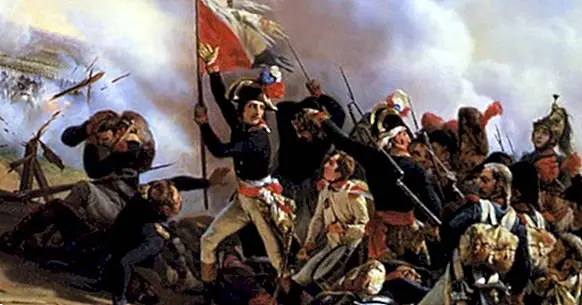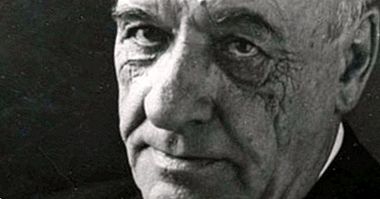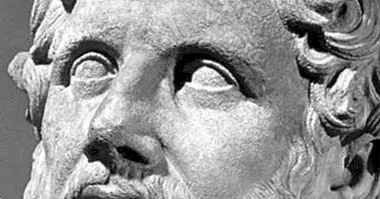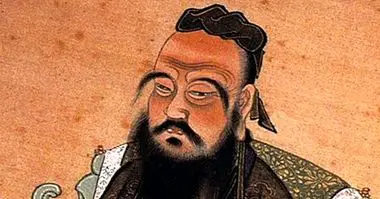The 70 best phrases of Revolution and social change
Revolutions are changes of paradigm in which a radical transformation takes place in a cultural sphere or in a society in general. Many times they generate a confrontation because of the contradictions they overcome, but they also make progress more probable.
In this article you will find a selection of phrases of revolution that put in words the ideas and the conception of the world associated with the revolutionary change of different stages of history, from the hand of important historical figures such as John F. Kennedy, Ralph Waldo Emerson, Lenin, Kemal Ataturk or Karl Marx, among others.
- Related article: "123 wise phrases to reflect on life"
Phrases of Revolution and struggle for progress
In the compilation of phrases about the revolution that you will find in the following lines, a specific order has not been established obeying a certain criterion. All of them can lead us to reflect on how the social and economic context transforms our way of thinking and vice versa.
1. Better to die fighting for freedom than to be a prisoner every day of your life. (Bob Marley)
One of Bob Marley's most remembered phrases, referring to the necessity of insubordination and non-obedience in cases where there are injustices.
2. The revolution is not an apple that falls when it is rotten. You have to make her fall. (Che Guevara)
Against the deterministic vision of revolutionary change: it will not happen without more unless the people move actively to make it arrive.
3. A revolution is an idea taken by bayonets. (Napoleon Bonaparte)
Napoleon, against the idealist idea that radical changes in society come through the simple exchange of ideas.
4. Those who make the peaceful revolution impossible, will make violent revolution inevitable. (John F. Kennedy)
The more a set of needs is oppressed and the more prevented from exercising rights, the more it is facilitated that clearly violent revolutions erupt.
5. A revolution is not a bed of roses. A revolution is a struggle between past and future. (Fidel Castro)
Fidel Castro talks about the confrontations inherent in revolutions.
6. When the dictatorship is a fact, the revolution becomes a right. (Victor Hugo)
These radical changes can be understood as a rejection of an entire system that although it is well established and can be considered "normal", is unfair and harmful to the majority.
7. You can kill a revolutionary but you can never kill the revolution. (Fred Hampton)
Hampton distinguishes between individuals and the contexts that drive revolutionary change.
8. It is better to die standing than to live on your knees. (Emiliano Zapata)
A revolutionary phrase that has become a classic.
- Maybe you're interested: "The 50 best phrases of Emiliano Zapata, the mythical Mexican revolutionary"
9. The greatest and most powerful revolutions often begin very quietly, hidden in the shadows. (Richelle Mead)
About the paradoxical character of the radical changes when they are in their initial stage.
10. The first duty of a man is to think for himself. (Jose Marti)
Not to depend on the approval of the rest and to see beyond the limitations of a culture does not have to be a purely individualistic act; It can also end up benefiting everyone.
11. The only way to support a revolution is to make yours. (Abbie Hoffman)
In the revolutions also the individual wills are collected.
12. Do not change things fighting the existing reality. You change something by building a new model that makes the existing model obsolete. (Buckminster Fuller)
The simple act of destroying does not have to bring something new.
13. Sometimes you have to take a weapon to lower a weapon. (Malcolm X)
A reflection that characterizes the rejection of unconditional nonviolence on the part of this Malcolm X.
14. Poverty is the father of revolution and crime. (Aristotle)
Poverty creates confrontation, according to the Greek philosopher.
- Related article: "The 9 rules of democracy that Aristotle proposed"
15. The sin of silence when they should have protested makes men cowardly. (Abraham Lincoln)
Irresponsibility does not only come through action, it also comes through non-action when what is needed is action.
16. Every revolution seems impossible at the beginning and, after its occurrence, was inevitable. (Bill Ayers)
These changes also affect our historical perspective.
17. Societies in decline have no use for visionaries. (Anaïs Nin)
An interesting aphorism about progress.
18. The end could justify the means as long as there is something to justify the end. (Leon Trotsky)
If the purpose is not sustained, there is no discussion about the sacrifices necessary to achieve it.
19The revolution never goes backwards. (William Henry Steward)
Another interesting aphorism about change.
20. The revolution is not a fixed thing of an ideology, nor something of a decade in particular. It is a perpetual process imbedded in the human spirit. (Abbie Hoffman)
Hoffman sees the revolution as something inherent in the historical development of societies .
21. There is no such thing as a non-violent revolution. (Malcolm X)
Another of the phrases about the revolution by Malcolm X.
22. The most heroic language in the world is the revolution. (Eugene V. Debs)
About the tendency to transform by investing in it great efforts.
23. If you want to rebel, rebel from inside the system. That is much more powerful than rebelling from the outside. (Marie Lu)
An opinion regarding the classic inside-out distinction when talking about systems of human organization.
24. The revolution introduced me to art, and in turn, art introduced me to the revolution. (Albert Einstein)
A personal reflection by this great scientist.
25. Each generation needs a new revolution. (Thomas Jefferson)
Each generation brings new ways of living and interpreting reality.
26. There is no end; the revolutions are endless. (Yevgeny Zamyatin)
Another opinion in line with those who see in the revolutionary a fact that is part of the essence of history.
27. You can not buy the revolution. You can not make the revolution. You can only be the revolution. It is in your spirit or it is not anywhere. (Ursula K. Le Guin)
About the necessary implication to promote revolutionary processes.
28. Until the victory always. (Ernesto Guevara)
One of the most well-known revolutionary shouts, although it is based on an error: originally, it said "Until the victory. Always, fatherland or death. " Fidel Castro read it changing the score.
29. We have no right to think that freedom can be won without fighting. (Che Guevera)
Ideological errors They can harm people.
30. We have the power to start the world anew. (Thomas Paine)
About the ultimate goal of the revolutionaries.
31. There are decades where nothing happens; and there are weeks where decades occur. (Vladimir Ilich Lenin)
An apparent paradox.
- Related article: "The 24 best famous quotes of Lenin"
32. Every revolution was first a thought in the mind of a man. (Ralph Waldo Emerson)
This is an idealist vision of the revolution.
33. The seed of revolution is repression. (Woodrow Wilson)
Contrary to what might be expected, oppression fuels disobedience.
34. You can not make a revolution with silk gloves. (Joseph Stalin)
One of the most remembered phrases of Stalin.
35. Art is plagiarism or revolution. (Paul Gauguin)
A very radical dichotomy.
36. The revolution has always been in the hands of young people. The young always inherits the revolution. (Huey Newton)
A fundamental distinction by age strata, although very debatable.
37. It is not the insurrection of ignorance that is dangerous, but the revolt of intelligence. (James Russell Lowell)
The intellectual fields, sometimes, they can act as a simple defense of the status quo and what has always been done.
38. Every revolution evaporates and leaves behind only the slime of a new bureaucracy. (Franz Kafka)
A pessimistic metaphor about revolutions.
39. While fighting separately, they are defeated together. (Tacit)
About the need for collective organization.
40. A revolution is born as a social entity within the oppressive society. (Paulo Freire)
The revolution seen as a gestation process.
41. Ask for work. If you do not get a job, ask for bread. If you do not get work or bread, take the bread. (Emma Goldman.)
Goldman questions the idea that the present social organization has to be defended by the simple fact of being so.
42. Give me time and I will give you a revolution. (Alexander McQueen)
Another of the aphorisms that assimilate the revolutions to the advance of history.
43. Revolutions begin with the word and conclude with the sword. (Jean Paul Marat)
A sequential vision of revolutionary changes.
44. If I can not dance, I do not want to be part of your revolution. (Emma Goldman)
A personal reflection that has become a propaganda slogan very common especially in feminist areas .
45. Political power is simply organized power of one class to oppress another. (Karl Marx)
Marx had a conception of social organization as different forms adopted by the class struggle.
46. Revolution means democracy in today's world, not the enslavement of peoples to the corrupt and degrading horrors of totalitarianism. (Ronald Reagan)
Reagan tried to portray revolutionary processes outside the United States as processes of social corruption that should be stopped.
47. It is impossible to predict the time and progress of the revolution. It is governed by its own mysterious wars. (Vladimir Lenin)
Each revolution is unique.
48. The revolution is a dictatorship of the exploited against the exploiters. (Fidel Castro)
Castro questioned whether all dictatorships were the same.
49. You can imprison a revolutionary, but you can not imprison the revolution. (Huey Newton)
It is not possible to isolate a political change by isolating people.
50. The revolution is the festival of the oppressed. (Germaine Greer)
A place where those who have been subjugated they have the opportunity to free themselves .
51. The revolution that takes place in your head, nobody will see it. (Gil ScottHeron)
If ideas are not externalized, there is no point in rebelling.
52. Rebellion to tyrants is obedience to God. (Thomas Jefferson)
A paradox based on religious thought.
53. The worst enemy of the revolution is the bourgeois that many revolutionaries carry inside. (Mao Tse Tung)
Mao talks about the contradictions that live inside the revolutionaries.
54. We fight against misery but at the same time we fight against alienation. (Che Guevara)
A double fight.
55. A revolution is impossible without a revolutionary situation; Furthermore, not every revolutionary situation leads to revolution. (Vladimir Lenin)
Before the revolution, it is necessary that certain situations occur.
56. Philosophers have limited themselves to interpreting the world in different ways; What it is about is transforming it. (Karl Marx)
The philosophy seen as a tool of change.
57. Without revolutionary theory, there can be no revolutionary movement. (Vladimir Ilich Lenin)
The actions need a coherent way of looking at the problem and proposing other options .
58. You can not make a revolution to establish democracy. You must have a democracy to have a revolution. (G. K. Chesterton)
According to this point of view, the revolution arises from a democratic process.
59. Revelation can be more dangerous than revolution. (Vladimir Nabokov)
There are changes of conception that precipitate change in themselves.
60. The French Revolution taught us the rights of man. (Thomas Sankara)
About a qualitative change in history.
61. Revolutions occur in dead ends. (Bertolt Brecht)
When there are no more options left, it breaks with the system.
62. A reform is a correction of abuses, a revolution is a transfer of power. (Edward G. BulwerLytton)
About the qualitative change that comes with the revolution.
63. The truth is always revolutionary. (Vladimir Lenin)
A very remembered aphorism.
64. Those who are inclined to compromise can never make a revolution. (Kemal Ataturk)
This is one of the phrases about the revolution that speak about blind obedience.
65. Whoever kneels before the fait accompli is incapable of facing the future. (Trotsky)
Trotsky saw conformism with present reality as a trap that leads us not to see the new coming.
66. Those who are not capable of defending old positions will never be able to conquer the new ones. (Trotsky)
Progress seen as an accumulation of goals.
67. We can not have a revolution that does not involve and free women. (John Lennon)
On the need to cover different sources of inequality.
68. There can not be a total revolution but a permanent revolution. Like love, it is the fundamental enjoyment of life. (Max Ernst)
Each time you will find new ways to keep progressing.
69. Revolutions are not made by trifles, but born by giblets. (Aristotle)
A spark can engender transformation.
70. To impute the revolution to men is to impute the tide to the waves. (Victor Hugo)
This phrase of revolution speaks of this change as something systemic linked not to the individual but to the collectives.



















